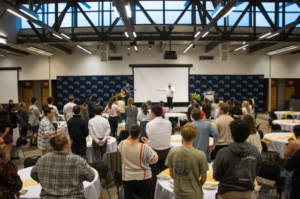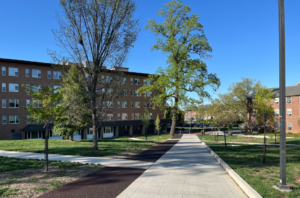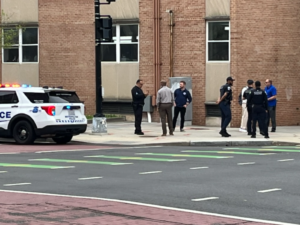CUA on Tap: “Gay and Catholic”
by Rachel Gallagher
The latest CUA on Tap event hosted author Eve Tushnet for an event titled, “Gay and Catholic: Accepting my Sexuality, Finding Community, Living my Faith.” Students filled the Edward J. Pryzbyla Great Room to hear Tushnet talk about the ways in which members of the LGBT community can navigate their faith as well as develop non-romantic relationships and communities. Tushnet also presented ways for Catholics to help the LGBT community—particularly their fellow Catholics who identify as LGBT—in the future.
Tushnet opened the talk by saying she “hopes to be honest about [her] experiences” as she detailed her journey in Catholicism as a gay woman. Raised in a “secular-Jewish” household, Tushnet said she was relieved when she began to understand her sexuality and settle into that identity throughout high school. Tushnet’s initial attraction to Catholicism is most rooted in the beauty she found in the Eucharist and the important distinction made by her Catholic friends between individual Catholics and the Catholic Church allowed her to “see the Church as the bride of Christ.” At nineteen, Tushnet decided to convert to Catholicism.
However, this journey was not as easy as her self-described “impulsive 19-year-old self” had initially thought. She found that she was given very little spiritual guidance on how to live a fruitful, loving life as a gay Catholic; the guidance she was given was overwhelmingly focused on avoiding sin, particularly on avoiding lust. To find a path forward, she found inspiration in Jesus. Jesus emphasized the power of love in friendship. Tushnet quoted John 15:13 “Greater love has no one than this: to lay down one’s life for one’s friends” and underscored the tendency in contemporary society to only equate the idea of love with the love shared between a parent and their child or between romantic partners. Tushnet elaborated on finding alternative “pathways of love” beyond these two contemporary understandings of love—parental and romantic—which are accessible for same-sex attracted Catholics who wish to live in communion with Church teaching.
The four “pathways of love” Tushnet talked about are friendship, god-parenthood, monastic life, and intentional communities. Tushnet said that fulfilling love that can be found in these types of relationships.
“In order to see these non-marital forms of love as beautiful,” said Tushnet, “we have to be able to see celibacy as something beautiful and worthy of honor.” In celibacy Jesus can again be seen as a model. The contemporary understanding of celibacy is often labeled as a “deprivation.” However, Tushnet explained celibacy as a “channel for love” and a way of strengthening one’s relationship with God, because when one’s relationships—romantic or otherwise—struggle or falter an individual may always trust in his or her foundational relationship with God.
The final portion of Tushnet’s talk focused on how the Catholic community can welcome members of the LGBT community in the future and offer healing for past transgressions. Her main suggestion for Catholics is to ask the Church’s “same-sex and gay attracted children” what would make it possible for them to “view our way as a way that is fruitful for [them] and not barren and isolated.”
Tushnet made a point to comment on the Church’s past tendency of talking to LGBT Catholics as opposed to talking with them.
“There are unique things the LGBTQ community faces that others don’t,” said Carly Tomaine, President of CUAllies. “If you see someone who identifies as LGBTQ that is looking for love, that is looking for someone in the church to listen to them, listen to them.”
Tomaine also mentioned the collaboration between CUAllies and Campus Ministry on a retreat that will take place on March 25th, which focuses on LGBTQ individuals within the Catholic community.
There is still work to be done though, according to Tomaine: “[The university] needs to publicly acknowledge [CUAllies] because no one wants to be pushed to the side.”
At the close of CUA on Tap, Fr. Jude DeAngelo, University Chaplain and Director of Campus Ministry, called for students to “begin and end conversations from a standpoint of deep friendship and relationship in Christ.”








